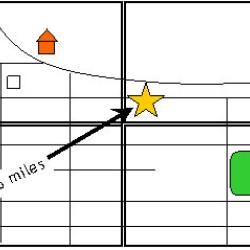Source Institutions
Source Institutions
Add to list Go to activity
Activity link broken? See if it's at the internet archive

In this activity, learners shrink the scale of the vast solar system to the size of their neighborhood. Learners are challenged to consider not only the traditional "planets," but also some of the smaller objects orbiting the Sun. Learners compare the relative sizes of scale models of the planets, two dwarf planets, and a comet as represented by fruits and other foods. They determine the spacing between the scaled planets on a map of the neighborhood and relate those distances to familiar landmarks. This activity is part of a sequence of activities focused on Jupiter's immense size.
- 10 to 30 minutes
- 45 to 60 minutes
- Over $20 per group of students
- Ages 8 - 14
- Activity, Lesson/Lesson Plan, Model
- English
Quick Guide
Materials List (per group of students)
- (55"–wide) giant pumpkin OR (55"–wide) model pumpkin (made from Halloween orange pumpkin garbage bag filled with packing peanuts or pillows)
- (5 1/2"–wide) large mango or potato
- (4 1/2"–wide) large orange or cantaloupe or coconut
- (2”–wide) plum
- (2"–wide) kiwi or lime
- (1/2"–wide) small grape
- (1/2"–wide) large blueberry
- (1/4"–wide) pea or navy bean
- (1/5"–long) uncooked orzo pasta
- (3/32"–wide) grain of uncooked rice
- (1/16"–wide) grain of uncooked rice
- (1/64"–wide) poppy seed
- Measuring tape (to measure a distance of 190 feet)
- Coloring supplies, including markers and colored pencils
- 1 set of Our Solar System lithographs (NASA educational product number LS–2001–08–002–HQ), preferably double–sided and in color (optional)
- 1 (22" x 32" or larger) neighborhood map, extending to 6 miles from your geographic location, prepared as described under "Preparation" using either a photocopier and a detailed local map or mapping software and a printer
- 11 (20") strings
- Ruler
- Tape
- 11 coffee stirrers
- Planet Labels
- Access to the online song “11 Planets” by Lisa Loeb - link is at the bottom of the page (optional)
- A large area where the children can model the orbit of Mercury around the Sun (perhaps outdoors for this portion of the activity)
- A large wall, table, or floor space for posting or laying the map down
- "Solar System in My Neighborhood" pages
- Pens or pencils
Subjects
-
Earth and Space Science
- Astronomy
-
Solar System
- The Planets
- Asteroids and Comets
-
Mathematics
-
Measurement
- Units of Measurement
-
Number and Operations
- Fractions
- Multiples and Factors
- Representation
-
Measurement
-
Physical Sciences
- Structure and Properties of Matter
Informal Categories
- Food and Cooking
- Model Building
- Outdoor Activity
Audience
To use this activity, learners need to:
- see
- read
- be mobile
- touch
Learning styles supported:
- Involves teamwork and communication skills
- Involves hands-on or lab activities
Other
Components that are part of this resource:
- Big Kid on the Block (activity series)
- "My Trip to Jupiter" Journal
- Background Information: Secrets of the Solar System Family
- Background Information: The Other Distant Giants Are Kindred Planets with Individual Quirks
- Background Information: Inner, Rocky Neighbors Are Siblings to Earth
- Background Information: Countless Small Objects Are Part of Our Solar System's Extended Family
- Shopping List
- Solar System in My Neighborhood: Planet Sizes and Distances
- Family Portrait...in Numbers (optional)
Includes alignment to state and/or national standards:
This resource is part of:
Access Rights:
- Free access
By:
- Department of Education and Public Outreach, Lunar and Planetary Institute; Juno Education and Public Outreach, NASA
Rights:
Funding Source:
- NASA
